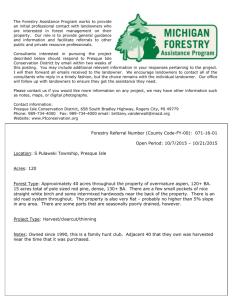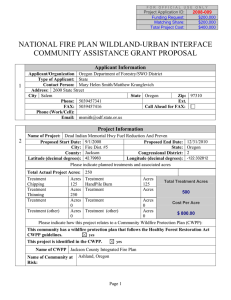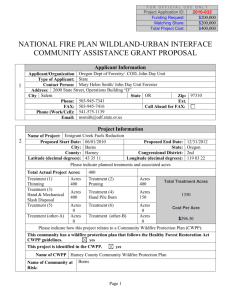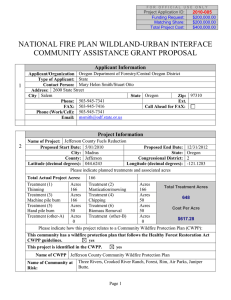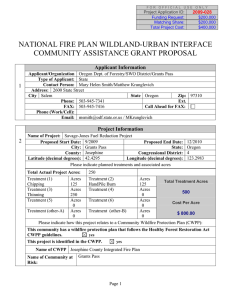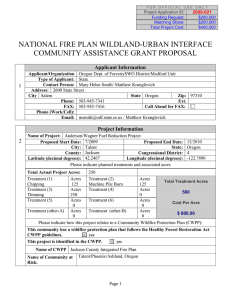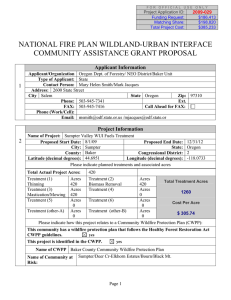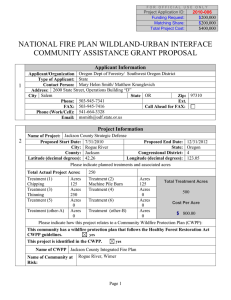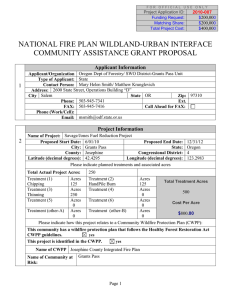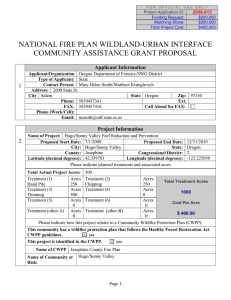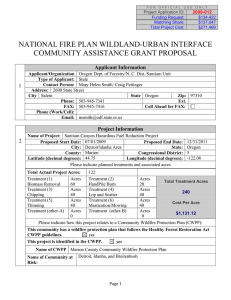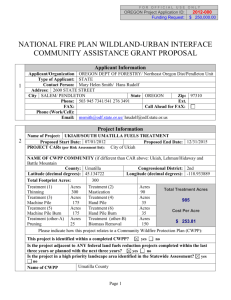ODF – Seneca Defensible Space & Hazard Fuel Reduction
advertisement
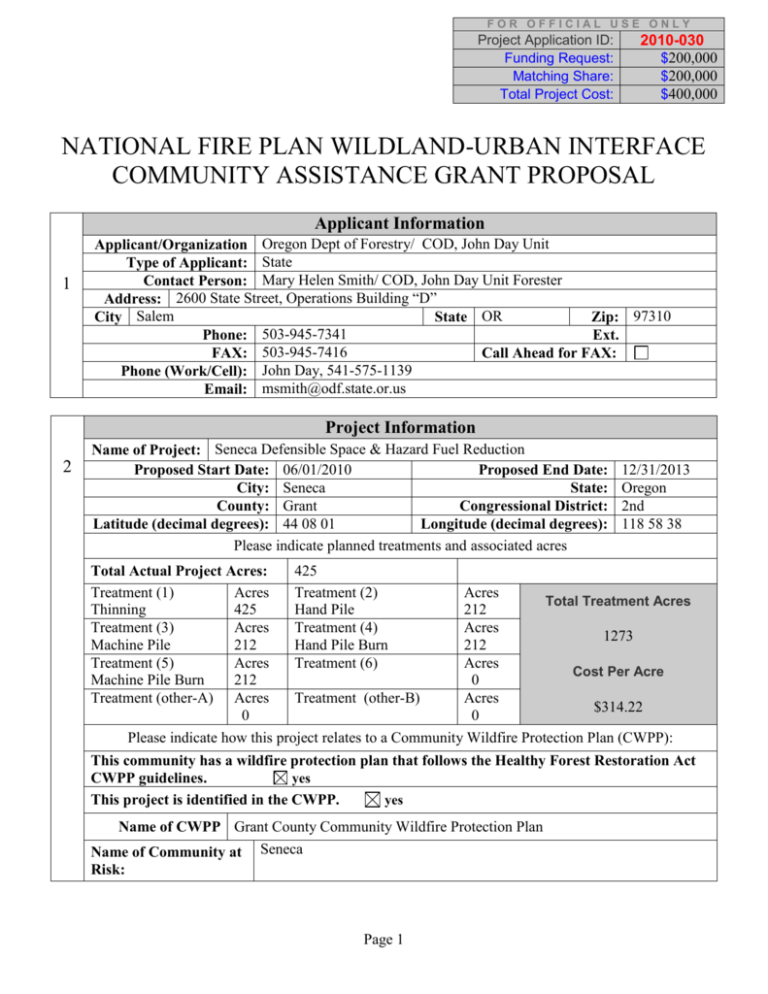
FOR OFFICIAL USE ONLY Project Application ID: Funding Request: Matching Share: Total Project Cost: 2010-030 $200,000 $200,000 $400,000 NATIONAL FIRE PLAN WILDLAND-URBAN INTERFACE COMMUNITY ASSISTANCE GRANT PROPOSAL Applicant Information 1 Applicant/Organization Oregon Dept of Forestry/ COD, John Day Unit Type of Applicant:: State Contact Person: Mary Helen Smith/ COD, John Day Unit Forester Address: 2600 State Street, Operations Building “D” City Salem State OR Zip: 97310 : : Phone: 503-945-7341 Ext. FAX: 503-945-7416 Call Ahead for FAX: Phone (Work/Cell): John Day, 541-575-1139 Email: msmith@odf.state.or.us Project Information 2 Name of Project: Seneca Defensible Space & Hazard Fuel Reduction Proposed Start Date: 06/01/2010 Proposed End Date: City: Seneca State: County: Grant Congressional District: Latitude (decimal degrees): 44 08 01 Longitude (decimal degrees): Please indicate planned treatments and associated acres 12/31/2013 Oregon 2nd 118 58 38 425 Total Actual Project Acres: Treatment (1) Acres Treatment (2) Acres Total Treatment Acres Thinning 425 Hand Pile 212 Treatment (3) Acres Treatment (4) Acres 1273 Machine Pile 212 Hand Pile Burn 212 Treatment (5) Acres Treatment (6) Acres Cost Per Acre Machine Pile Burn 212 0 Treatment (other-A) Acres Treatment (other-B) Acres $314.22 0 0 Please indicate how this project relates to a Community Wildfire Protection Plan (CWPP): This community has a wildfire protection plan that follows the Healthy Forest Restoration Act CWPP guidelines. yes This project is identified in the CWPP. yes Name of CWPP Grant County Community Wildfire Protection Plan Name of Community at Seneca Risk: Page 1 Project Area Description All information for the project must fit into the space provided below. Attachments will not be considered by the review committee. 3 Provide a brief overview of the project and the project area. (If applying for a fuels reduction project, identify vegetation types, fire regime) [1500 Characters Maximum] Seneca is a small community in South Central Grant County, the area has a "High" hazard rating in the Grant Co. CWPP and the Statewide Risk Assessment. Project would provide funding for defensible space and reduce hazardous fuels on private lands (425 acres). This area is surrounded by USFS lands on four sides. The Seneca community is an incorporated town (population of 184) with numerous private land parcels in and adjacent to USFS managed lands. The fuel loadings surrounding the community are heavy. The vegetation types are primarily dry site mixed conifer, ponderosa pine, with a fringe of western juniper & sage at the lower elevations. The area immediately adjacent to this community has a long history of large project fires since 1986. The Fire Regime for this project area is Fire Condition Class 2. Project Timeline All information for the project must fit into the space provided below. Attachments will not be considered by the review committee. 4 Provide a timeline for the project. [500 Characters Maximum] The ODF field unit has a current list of landowners in the vicinity that have expressed interest in a fuels reduction program. * Summer 2010 landowner outreach and educational materials distributed * Summer 2010 - Fall 2011 landowners sign cost share agreements, projects are prioritized, and forester treatment plan finalized with landowners * Fall 2011 - Fall 2013 ongoing new landowners added to project participants, monitoring of progress of landowners on completion of work and final inspection to assess completion of project and authorize payment be made. *Annual and final accomplishment reporting will occur. Page 2 Scope of Work All information for the project must fit into the space provided below. Attachments will not be considered by the review committee. 5 Provide a brief scope of work which clearly describes how grant funds will be spent. (This should be more specific than the project description) [1500 Characters Maximum] Project will provide financial incentives with cost share opportunities for private landowners to create defensible space around the structures and community on private lands and treat the remainder of the private forestland that are in scattered parcels throughout the area. This work will coincide with work being accomplished and planned by Malheur National Forest. Scotty-Damon, Canyon Creek WUI, Antelope and Burns BLM Hopper Stewardship are all federal projects adjacent to the proposed project area. The treatments would include, clearing defensible space around homes and structures, pre-commercial thinning forest stands and treatment of slash. In addition, ongoing prevention education and hazardous fuels mitigation technical assistance is provided to commercial operators in the area. Interagency Collaboration All information for the project must fit into the space provided below. Attachments will not be considered by the review committee. 6 Specify the private, local, tribal, county, state, federal and/or non-governmental [501(c)(3)] organizations that will contribute to or participate in the completion of this project. Describe briefly the contributions each partner will make (i.e. – donating time/equipment, funding, etc.) [500 Characters Maximum] Collaboration is with the private landowners for accomplishing work on private lands. Coordination is with the Malheur National Forest and the Blue Mountain Ranger District to coordinate activities on federal lands adjoining the Seneca Community. Contributions; the private landowners will contribute in-kind services or directly pay cash dollars to have the work done as part of the 75/25% cost share agreement. The Oregon Department of Forestry will provide time and equipment in administering the projects with the private landowners. Page 3 Project Longevity / Maintenance All information for the project must fit into the space provided below. Attachments will not be considered by the review committee. 7 Clearly describe how the proposed treatments will be maintained over time. [500 Characters Maximum] The hazardous fuel reduction treatment prescriptions for defensible space and thinning will be planned for a life expectancy of 15 years. Landowner signed cost share agreements require landowners to maintain the fuels treatment for 10 years. Fuels in the defensible space area will require minor maintenance by the landowner. Biomass Utilization All information for the project must fit into the space provided below. Attachments will not be considered by the review committee. For the purpose of this application, biomass utilization is defined as any practicable end-use of the material that has value, or the trading of capital for the woody material. 8 Biomass from treatment(s) will be utilized. (check one) yes no 1) If yes, how is it planned to be used, or what is the end-result (wood products, steam/energy, mulch etc.) [500 Characters Maximum] As part of the landowner introduction and process through the cost share agreement, they will be encouraged to utilize biomass as much as possible either for personal firewood or firewood use within the community. In addition, alternatives like posts/poles, landscape mulch, .and stock bedding will also be suggested. Any co-gen opportunities that develop will be shared with landowners as an alternative as well. 2) Identify company or contractors involved in project utilization. [250 Characters Maximum] Individual participating landowners and local fire wood contractors. 3) Estimate anticipated value of biomass to be removed ($/Green Ton; $/Bone-dry Ton; $/Hundred Cubic Feet (CCF), $/Acre Treated) [250 Characters Maximum] 200 cords @ 160/cord = $32,000 Page 4 Project Budget Cost Category Description Federal Agency Matching Share Applicant Landowners Partner 2 Total Personnel $112,109.00 $0.00 $112,109.00 $0.00 $0.00 $0.00 0 $0.00 $0.00 $0.00 $156,865.00 $6,700.00 $163,565.00 $55,218.00 $0.00 $55,218.00 $0.00 $0.00 $0.00 $0.00 $0.00 $0.00 $77,262.00 $0.00 $77,262.00 $0.00 $0.00 $0.00 $0.00 $0.00 $0.00 $0.00 $0.00 $0.00 $1,680.00 $0.00 $1,680.00 Subtotal $0.00 $0.00 $0.00 $0.00 $0.00 $0.00 $0.00 $0.00 $0.00 $0.00 $0.00 $0.00 $0.00 $1,500.00 $0.00 Subtotal $1,500.00 $0.00 $0.00 $0.00 $0.00 $0.00 $0.00 $0.00 $0.00 $0.00 $1,500.00 $0.00 $1,500.00 $98,020.00 $0.00 Subtotal $98,020.00 $0.00 $0.00 $0.00 $32,673.00 $32,673.00 $0.00 $0.00 $0.00 $130,693.00 $0.00 $130,693.00 $0.00 $0.00 $0.00 $0.00 $0.00 $0.00 $0.00 $0.00 $0.00 $12,000.00 $10,000.00 $22,000.00 ODF NRS2 Salem Grant Admin (5%) $44,756.00 $6,700.00 Subtotal $51,456.00 Fringe Benefits Field OPE Salem Grant Admin $22,044.00 $3,300.00 (5%) Subtotal $25,344.00 Travel $.42 x 4,000 miles (motor pool) $1,680 $0.00 Subtotal $1,680 Equipment $0.00 $0.00 Supplies Misc field/office supplies Contractual Landowner Cost Share Other COD/John Day/EOA Indirect $12,000 Agency Indirect (5%) $10,000 $22,000.00 Total Costs Subtotal $200,000 $167,327.00 $0.00 $32,673 $0.00 $400,000.00 Project (Program) Income1 (using deductive alternative) 1 Program income is the gross revenue generated by a grant or cooperative agreement supported activity during the life of the grant. Program income can be made by recipients from fees charged for conference or workshop attendance, from rental fees earned from renting out real property or equipment acquired with grant or cooperative agreement funds, or from the sale of commodities or items developed under the grant or cooperative agreement. The use of Program Income during the project period may require prior approval by the granting agency.
